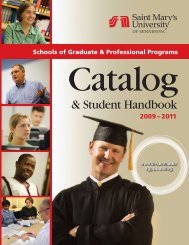PDF version - Saint Mary's University of Minnesota
PDF version - Saint Mary's University of Minnesota
PDF version - Saint Mary's University of Minnesota
You also want an ePaper? Increase the reach of your titles
YUMPU automatically turns print PDFs into web optimized ePapers that Google loves.
Physics<br />
Physics<br />
Paul J. Nienaber, SJ, Ph.D., Chair<br />
Physics is the study <strong>of</strong> the structure <strong>of</strong> the material universe, the particles that comprise it, and the forces<br />
by means <strong>of</strong> which these particles interact. The mission <strong>of</strong> the physics department is to help students<br />
understand that structure and those particles and forces, and appreciate and apply these fundamental<br />
principles.<br />
Consistent with the mission <strong>of</strong> <strong>Saint</strong> Mary’s <strong>University</strong>, the physics department seeks to develop the<br />
pr<strong>of</strong>essional competencies <strong>of</strong> its graduates and to instill in them a habit <strong>of</strong> lifelong learning.<br />
General Department Goals<br />
To this end, the physics department presents to students a broad survey <strong>of</strong> the interconnected concepts<br />
<strong>of</strong> classical and twentieth-century physics, and develop in students an array <strong>of</strong> problem-solving skills<br />
appropriate to and involving those concepts.<br />
All students in physics classes should gain an appreciation <strong>of</strong> science as a human and creative endeavor,<br />
acquire and be able to apply skills <strong>of</strong> quantitative reasoning, and understand science’s distinctive<br />
disciplinary methodology, with its emphasis on experimentation and open communication. Science<br />
majors in physics courses should in addition master foundational physics principles and analytical<br />
methods, learn experimental techniques to test physical models, and be able to apply these principles,<br />
methods, and techniques to their own pr<strong>of</strong>essions. Physics majors should add to these goals an<br />
introduction to the abstract models and advanced experimental techniques used in the study <strong>of</strong> physics<br />
as a pr<strong>of</strong>ession, to provide groundwork for their future study or careers.<br />
Through knowledge <strong>of</strong> these concepts and acquisition <strong>of</strong> these skills, students then are able to:<br />
• Live, continue learning, and pursue careers as scientifically literate and technologically competent<br />
adults;<br />
• Demonstrate and pr<strong>of</strong>it from their expertise in the techniques <strong>of</strong> modern experimental physics and<br />
electronics;<br />
• Appropriately and advantageously employ computer technology both for data acquisition and<br />
processing, and algorithm development and execution; and<br />
• Communicate their knowledge and skills effectively and cogently in a variety <strong>of</strong> modalities (oral,<br />
written, and graphical).<br />
The physics curriculum is designed to meet the needs <strong>of</strong> students who wish to teach, do research,<br />
undertake graduate study, or to enter engineering pr<strong>of</strong>essions or such interdisciplinary fields as<br />
biophysics, astrophysics, medical physics, health physics, etc. The physics department endeavors to<br />
help students see the impact <strong>of</strong> scientific thought, methods, and discoveries on contemporary society.<br />
Through class and laboratory work, students develop the ability to interpret phenomena in light <strong>of</strong><br />
existing theories. A strong emphasis is placed upon laboratory experience in order to bring students to<br />
a level where they can work independently, and where they have developed initiative and reliability in<br />
their work.<br />
The <strong>Saint</strong> Mary’s chapter <strong>of</strong> the national physics honor fraternity Sigma Pi Sigma was founded in 1964; it<br />
is the second-oldest chapter <strong>of</strong> this prestigious society in the state <strong>of</strong> <strong>Minnesota</strong>.<br />
Majors Offered:<br />
Physics<br />
Physics with an Engineering Science Emphasis<br />
Physics with a Life Science Emphasis<br />
Physics Science Education<br />
167 167
















